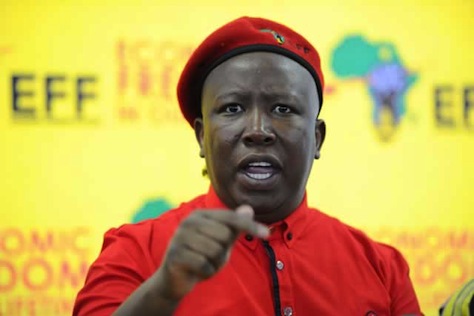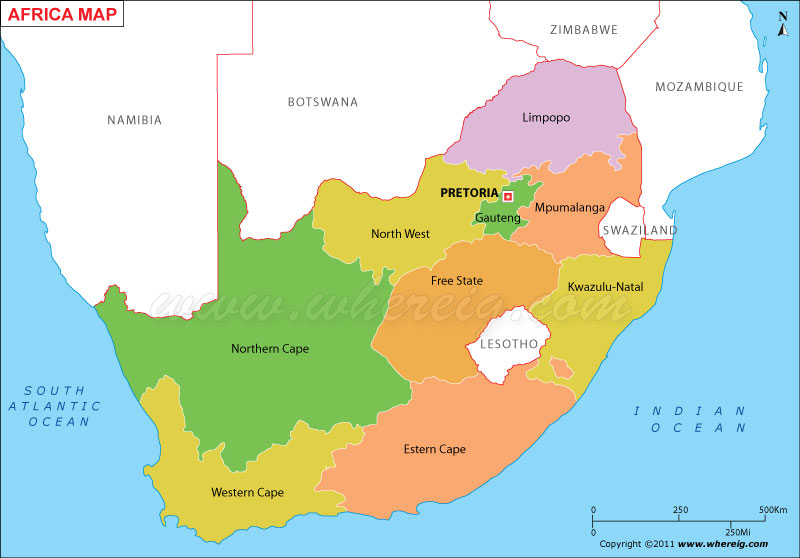He’s the enfant terrible of South African politics, and he’s garnered international headlines for his retro brand of leftist redistributive populism that hearkens back to the 1960s-era Marxism of the ruling African National Congress (ANC). ![]()
Banished from the ANC two years ago and now leading his own party, the Economic Freedom Fighters (EFF), Malema hopes to ride a wave of youth discontent over economic stagnation, unemployment and land reform to success on May 7. But it’s more likely than not that his following will be less impressive than the attention he’s already attracted.
* * * * *
RELATED: Even with victory assured, is the ANC’s future at risk?
* * * * *
Malema rose to prominence as a youth leader within the ANC in 2002, and he became the head of the ANC Youth League in 2008, initially with the full support of South African president Jacob Zuma. As the leader of the ANC’s Youth League (a position that the late Nelson Mandela once held), Malema powered the ANC’s strong 2009 election victory that elevated Zuma to the presidency.
But as Malema’s profile increased, however, so did his antics — and charges of corruption amid Malema’s clearly rising wealth and status. Yet Malema went far beyond the garden-variety graft that’s now commonly associated with ANC rule. He went to Zimbabwe in 2010 and delivered a full-throated endorsement of its longtime president Robert Mugabe, complicating Zuma’s efforts to steer a middle course between Mugabe and the Zimbabwean opposition, then part of a power-sharing government after the controversial 2008 elections. He openly flouted ANC policy by encouraging opposition groups in Botswana to overthrow what he considered a puppet regime.
Back in South Africa, Malema advocated the kind of nationalist land reforms that Mugabe implemented in Zimbabwe that largely caused white residents to flee and that plunged Zimbabwe’s economy into turmoil. Like Mugabe before him, Malema accuses white South Africans of having stolen land from the indigenous population and argues that black South Africans should confiscate land from white Africans without compensation. What’s more, Malema consistently broke with ANC policy to advocate not only for land redistribution, but for the nationalization of South African mines and other industries, causing further headaches for an ANC leadership that’s spent two decades allaying international investors that South Africa will never implement Mugabe-style policies.
Malema was convicted of hate speech in March 2010 for singing an apartheid-era anthem with the lyrics, ‘shoot the Boer,’ and again in September 2011, drawing condemnation from Zuma and other top ANC leaders. After several rounds with the ANC’s internal disciplinary committee, Malema was ultimately booted from the party in 2012. He quickly formed the EFF, a platform to continue waging his fight for land redistribution and nationalization.
It’s not difficult to understand why some South Africans would find Malema’s message appealing.
Two decades after the end of apartheid, too many South Africans are impoverished, especially black South Africans. When Malema argues that the political revolution of 1994 must now be followed by an economic revolution, there’s some merit in the view. Wealth in South Africa is chiefly limited to a pre-existing class of white South Africans and a newly ascendant class of black South Africans with links to the ANC elite. If you’re a poor, young black South African languishing with little hope in Soweto, you too might find some hope in Malema’s clarion call for redistribution. Nearly one-quarter of black South Africans are unemployed (a far higher proportion than white and coloured South Africans), and two-thirds of South Africans under the age of 25 are unemployed.
Malema, clad in his now-trademark red beret and with a cantankerous populism that could put Hugo Chávez to shame, also has the benefit of preaching a clear, simple message:
[Malema], on the other hand, is unequivocal. Nationalise everything, return all land to the indigenous people, and transfer white wealth to the black, previously exploited population. No nonsense and no apologies for offending anyone. It’s easy to understand and his large, young, mainly uneducated, impoverished constituency believes totally in the economic freedom he says he will fight for….
The thousands of people who gather outside courtrooms for him or to listen to Malema at Marikana or on the farms don’t care that he faces charges of corruption and that he enriches himself with all kinds of sleazy business ties; or that the ANCYL was bankrupted on his watch. They only see his raw passion and they believe it.
Nonetheless, by promising to deliver an economic transformation to black South Africans in the most barely disguised tones of racial animosity, Malema is cynically trying to win power through the misplaced hopes and anxieties of South Africa’s most vulnerable citizens. That makes him even worse than the existing ANC government, which despite its unsteady record on everything from health care to corruption to alleviating poverty, can boast relatively strong economic stewardship.
Malema today is probably more of a political sideshow than in 2009 — after all, he’s been kicked out of the ANC tent, and it doesn’t seem like he’ll be invited back anytime soon. But with Zuma term-limited after his virtually inevitable reelection following the May 7 vote, and with the ANC set to choose its new leader in 2017 (and therefore, the frontrunner to succeed Zuma in 2019), Malema might eventually attempt to challenge the relatively uninspired cast of potential successors, most of whom come from the same generation as Zuma and former president Thabo Mbeki.
In the meanwhile, though the EFF isn’t likely to pose a threat to ANC hegemony in 2014, it doesn’t mean his movement won’t have an impact this time around. Polls show that the EFF could win around 4% to 5% of the vote nationally, and it wouldn’t be surprising if Malema wins a significantly higher share. At the provincial level, the EFF will likely win between 10% and 15% in his home province of Limpopo (in the north of the country bordering Zimbabwe) and the neighboring Northwest province (in the north bordering Botswana). That would make the EFF the official opposition in two of the country’s nine provinces, giving Malema a platform to grow support between now and 2019.
Moreover, it’s almost certain that Malema and the EFF will displace both the Zulu-centric Inkatha Freedom Party (IFP), a once-violent ANC competitor that has been in decline since the 2000s, and the Congress of the People (COPE), Mosiuoa Lekota’s anti-Zuma breakaway faction that won 7.42% of the vote in 2009 but now looks likely to tank in 2014.
So long as South Africans remain wary of the opposition Democratic Alliance (DA) as a party of rich, white South Africans, and as long as South Africans seem unhappy with the increasingly corrupt and ineffective rule of Zuma and the ANC, it’s unwise to rule out Malema’s further rise, either from inside the ANC or outside it.
That could become a real possibility if Mugabe (pictured above, right, hosting Malema at State House in Harare in 2010) and the ruling Zimbabwe African National Union – Patriotic Front (ZANU-PF) decide to support Malema openly in the coming years.
The ANC and the ZANU-PF share a common struggle in the fight against minority white rule in the last half of the 20th century, and that’s one of the reasons that Mandela, Mbeki and Zuma have all treated the increasingly authoritarian and inept Mugabe so gently. It’s no secret that Mugabe and Malema have mutual affection for one another, but Mugabe has — so far — been reticent to support Malema in opposition to the ANC. If he does, it could not only provide Malema crucial financial support, but cloak Malema with the credibility of the man who ended white rule in Rhodesia.
Photo credit to Reuters/Philimon Bulawayo.


